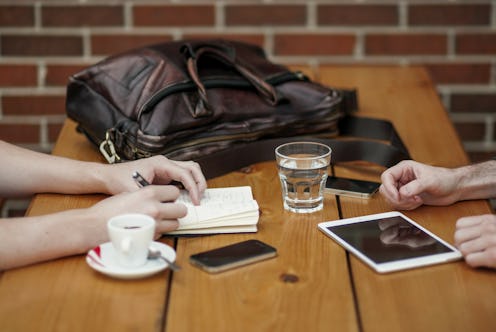Life
7 Everyday Habits That Can Make You Tired

Nothing is more frustrating than getting a solid seven to eight hours of sleep, only to feel exhausted the next day anyway. Your energy level depends on many factors, including certain everyday habits that can make you tired. You may think what you do in the morning and throughout your day only has an effect on that moment, but it can actually carry on to how you feel through the rest of the day and the days following.
Lack of sleep is always a problem when it comes to chronic tiredness, but in today's world, there are so many other components that can determine whether or not we feel fatigued. "Technology is a big part of the problem," says Dr. Robert Oexman, Director of the Sleep To Live Institute, to Bustle over email. "Smart phones, tablets, laptops, televisions and even video games have all affected our sleep. Years ago, people left work at the end of the day and there was no work after that. These days, people go to bed with their cell phones."
Technology, along with your diet, fitness, and work habits can all play a role in making you feel lethargic. If you're feeling sleepy everyday, you may want to see if you are doing any of these seven daily habits that could be causing you to feel tired.
1. Sitting At A Computer All Day
Sitting in the office all day without taking breaks can cause low energy and fatigue. "Most people have an attention span of 90 minutes then need a break," says psychotherapist Kelley Kitley, LCSW over email. To counter this drop in energy, take a walk for at least 20 minutes a day (LINK).
2. Not Drinking Enough Water
"Being even slightly dehydrated – as little as two percent of normal fluid loss – takes a toll on energy levels," says Dr. Avni Mahiji over email. Drinking six to eight cups of water a day can help diminish fatigue and help your heart pump oxygen and nutrients more efficiently.
3. Skipping Breakfast
Studies have found that eating protein, monounsaturated fats, and complex carbohydrates in the morning can help keep you satiated and energized throughout the rest of the day, but skipping breakfast can deprive you of this energy. "When you wake up in the morning, you should eat breakfast to give you a boost of energy that your body has burned while you were asleep," says Mahiji.
4. Using Technology Before Bed
"The glaring light of a tablet, smartphone, or your computer’s backlit screen can throw off your body’s natural circadian rhythm by suppressing melatonin, a hormone that helps regulate sleep and wake cycles," says Mahiji. "Sensitivity to the digital glow of tech toys can vary from person to person, but in general it’s a good idea to avoid all technology for one to two hours before bedtime."
5. Enjoying A Nightcap
A glass of wine before bed may sound relaxing, but having a drink before right before sleep decreases your ability to fall asleep and makes our sleep less restorative, says Dr. Shilpi Agarwal, MD over email. Drinking before bed alters our brain patterns during rest, which has been linked to drowsiness along with headaches and irritability. "Avoid having alcoholic drinks 2-3 hours before bed," she says.
6. Spending Too Much Time Indoors
"Often times, especially in the winter months, we are minimally exposed to sunlight," says Agarwal. "This can affect our circadian rhythm and our body's ability to secrete melatonin, which can affect our energy levels and make us feel more tired and lethargic." Exposing yourself to regular sunlight for five to 10 minutes a day can be a quick fix for lack of energy.
7. Skipping A Workout
Several research studies show that regular exercise helps us to get to sleep more quickly and stay asleep for longer," says Agarwal. "If you are skipping the gym regularly, you are likely to feel exhausted because you see larger energy dips and get fewer hours of deep sleep."
Images: Pixabay (8)